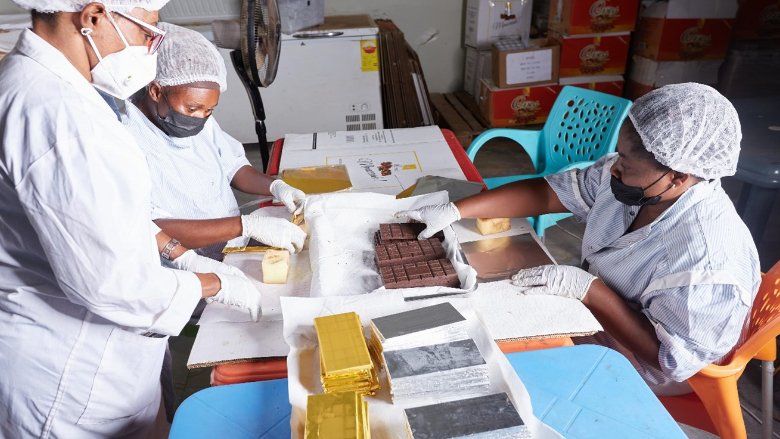Challenge
Ghana’s micro, small and medium enterprises (MSMEs) face considerable challenges in growing their businesses. They have limited access to finance and quality providers of technical assistance. They also have few skills and management capabilities. Women-owned firms face even tougher challenges, as they have limited access to land, capital, and more sophisticated business practices. The World Bank’s Business Pulse Surveys highlighted that the COVID-19 pandemic has further complicated these challenges. Thus, MSMEs have faced immediate liquidity challenges, firm closures, and widespread jobs losses.
Approach
The Ghana Economic Transformation Project (GETP) promotes private investment and firm growth. It creates favorable conditions for the expansion of enterprises with high-growth potential to contribute to economic dynamism and job creation (for example, by facilitating business registration and other regulations; promoting investments; establishing quality standards; and facilitating trade, access to land, and access to finance). The project supports and strengthens MSMEs and start-ups by providing financial and technical assistance ( for example, through business development services) in a rapid, but selective, transparent, and timely manner.
Results
- Following a rigorous selection process, the GETP supported 373 firms in maintaining their productive capabilities in the following sectors: agro-processing (140 firms); food and beverages (54 firms); manufacturing (106 firms); textiles and garments (55 firms); and pharmaceuticals (18 firms).
- The total assistance amounted to US$5 million (equivalent to GHS 28,733,200.00) to make up for liquidity shortfalls and allow for new investments in firms that had been affected by the COVID-19 pandemic — despite their previous good sales performance.
- The grant scheme had wide coverage, including support for firms from 15 of the 16 regions in Ghana.
- A total of 93 of the 165 firms surveyed reported that 369 additional jobs had been created, including jobs for 202 men and 167 women.
World Bank Group Contribution
The International Development Association (IDA) provides US$200 million for the Ghana Economic Transformation Project. Of the total project financing, US$5 million was set aside for COVID-19 recovery support for SMEs.
Partners
Ten implementing agencies in Ghana supported the project. They included the Ministry of Trade and Industry (MoTI); the Ghana Free Zone Authority (GFZA); the Registrar General’s Department (RGD); the Ghana Standards Authority (GSA); the Ghana National Accreditation Service (GhaNAS); the Ghana Investment Promotion Center (GIPC); the Ghana Enterprises Agency (GEA); the National Entrepreneurship and Innovation Programme (NEIP); and the Ghana Venture Capital Trust Fund (VCTF). In implementing the COVID-19 Recovery Grants Scheme, the GEA was the main counterpart. The direct, proactive relationship between the World Bank team and the GEA helped to accelerate the grants scheme's design and implementation, including by using the data from the World Bank Business Pulse Survey to design an automated scoring mechanism to speed up the selection process.
Looking Ahead
- The success, lessons and results emerging from the COVID-19 Recovery Grants window will contribute to the careful design and scaling of the “SME Growth Program”, which will be launched by early 2023. The new program will focus on a 360-degree assessment of business capabilities. As such, it will deliver custom-tailored technical assistance through group consulting and grants to beneficiaries. The lessons learned from the Ghana Economic Transformation Project will help to ensure that sustainability is built into the new program from the outset. An impact evaluation of both the COVID-19 Support Scheme and the SME Growth Program is also being implemented.
- A second round of financial assistance has been launched to target firms that met the eligibility requirements during the first round but could not be supported.
- The project will also target young entrepreneurs and youth-run SMEs in support of the government’s “YouStart Initiative.” As such, it will aim to address the youth unemployment challenges in Ghana.
Beneficiary Story/Quote
“Before COVID-19, our production was at 1,000 bars of chocolate per day, and we employed 20 workers, including permanent and casual workers. Then COVID struck, and we had to lay off all the 20 workers because production dropped to 200 bars per day.”
“I heard about the COVID-19 Recovery Grant through friends and the media, so I applied and received about 23,000 cedis equivalent. I purchased a chocolate-making machine that has boosted production by 40 percent, enabling me to employ more people.”
“Before COVID-19, we were making weekly sales of 1,000 kilograms (kgs) of fresh fish, but supply dropped to 400 kgs per week due to restaurant closures during the lockdowns.”
“I was watching TV and saw the launch of the COVID-19 Recovery Grants, so I applied and was subsequently selected. I used the grant funds to purchase a fish feed production line. Due to the support received, annual production has increased … from 20 tons to 40 tons, and employment has increased from 8 to 10 permanent [workers], and [from] 10 to 20 casual workers.”





